2022 Puerto Rico Mapping and Deep-Sea Camera Demonstration
April 4 - 28, 2022
Exploration Team
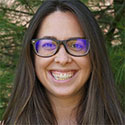
Shannon Hoy
Expedition Coordinator/Mapping Lead, NOAA Ocean Exploration
Shannon Hoy is an expedition coordinator with NOAA Ocean Exploration. She has always had a love of the ocean and pursued a bachelor’s degree in marine biology from the College of Charleston and a master’s degree in ocean mapping at the University of New Hampshire’s Center for Coastal and Ocean Mapping. While an undergraduate, she participated in four seafloor mapping expeditions, allowing her to increase her seafloor mapping knowledge and skills, make valuable connections, and travel to exotic places such as Indonesia and Antarctica. On two of these expeditions, she was a NOAA Ocean Exploration explorer-in-training on NOAA Ship Okeanos Explorer! These experiences greatly shaped her career and allowed her to further pursue her passion for ocean exploration. After graduation, Shannon worked for the U.S. Geological Survey’s Submarine Geohazards Group and the University of Bristol’s Paleoceanography group in the United Kingdom. She continued to map throughout these years and began specializing in habitat mapping, using high-resolution technologies and combining her interests in marine biology, geology, and seafloor mapping. /p>
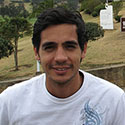
Fernando Aragon
Data Engineer, Global Foundation for Ocean Exploration
Fernando Aragon graduated from the University of Hawai‘i at Manoa with a bachelor’s degree in mechanical engineering. During his studies, he had experience in several fields including conceptual design, aerospace research, mechanical design, robotics and software development. From these activities he was able to intern for NASA at the Jet Propulsion Laboratory, present research at a national conference, and even co-author a technical paper in the Journal of the Astronautical Sciences. His most recent position was at the Field Robotics Laboratory (FRL), where he helped support operations, testing, and software development for two unmanned surface vehicles. From his time in FRL, he discovered a true passion for development and design of robotic systems. Originally from Colombia, Fernando enjoys outdoor activities and currently resides in State College, Pennsylvania.

Roland Brian
Video Engineer, Global Foundation for Ocean Exploration
Roland Brian brings 29 years of experience and a keen eye for precision high-definition video to the program as a video/satellite and telepresence engineer. Roland began his career in the U.S. Air Force where he worked as a satellite communications engineering technician with visions of working on the U.S. Space Station. He traded in that quest for one of deep-ocean exploration and sharing beautiful imagery with the world. He has worked with NOAA Ocean Exploration since 2009 and has been engaged in every telepresence-enabled remotely operated vehicle (ROV) expedition. He has also provided services for other projects using NOAA Ocean Exploration’s mobile telepresence system, including the 2012 Ring of Fire Expedition. His duties aboard NOAA Ship Okeanos Explorer include operation and maintenance of the ship's telepresence and video systems, including on ROVs Deep Discoverer and Seirios. Again, Roland’s experience embodies the breadth and depth of knowledge NOAA Ocean Exploration encourages. When not fine-tuning the video and telepresence systems or training and mentoring new team members, he's actively involved in the editing process of our ever-expanding ocean exploration video library. While not at sea, Roland enjoys life with his wife and family in sunny Sarasota, Florida.
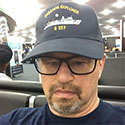
Brian Doros
Video Engineer, Global Foundation for Ocean Exploration
Brian Doros is a television broadcast engineer who was born in Long Branch, New Jersey. Active in sports throughout high school, Brian moved to Southern California and spent the next few years traveling the world surfing and then exploring his technical interests at college in San Diego, California. After changing his course of study to electronics, he focused on broadcast electronics and technical maintenance in broadcasting. His career path first led him to employment at IBM/MCA Video Laser Disc Company in Costa Mesa, California, doing research and development in the early days of optical laser disc, then to Los Angeles, where he specialized in film for television post-production. The next several years were spent working in the Hollywood post-production industry at Paramount Pictures, MGM/Lorimar Telepictures, 20th Century Fox, NFL Films, and Sony Broadcast Company North America, contributing to his 25 years of experience in television post-production and broadcast systems integration. After Hollywood, Brian worked in the field, traveling and upgrading network television facilities to digital broadcasting capabilities during the analog to digital conversion. He now has moved on to less broadcast traditional applications of his background working in his current position.
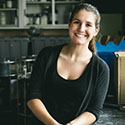
Katharine Egan
Science Coordinator, NOAA Ocean Exploration
Katharine Egan is a physical scientist and program coordinator at NOAA Ocean Exploration. She completed her bachelor’s degree in marine biology at the University of Rhode Island and her master’s in marine and environmental science at the University of the Virgin Islands. Her research background is primarily in geospatial analysis, spatial predictive modeling, and coral reef ecology. Throughout her career, Katharine has been involved with NOAA in several capacities. She interned at the NOAA National Centers for Coastal Ocean Science (NCCOS) in 2014 through the Ernest F. Hollings Scholarship Program. After completing her undergraduate studies, she joined NCCOS full time as a contractor as a GIS analyst working with data from the National Coral Reef Monitoring Program and compiling data for corals listed under the Endangered Species Act. Katharine joined NOAA Ocean Exploration in 2019 through the John A. Knauss Marine Policy Fellowship program and has stayed on since. Since joining, she has been leading an effort focused on improving the office's data accessibility and furthering the ’omics portfolio.
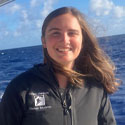
Cassie Ferrante
Explorer-in-Training, NOAA Ocean Exploration
Cassie Ferrante is an explorer-in-training with NOAA Ocean Exploration. A Colgate University graduate, she holds a bachelor’s degree in natural sciences with a topical emphasis in marine — freshwater science. She was part of Colgate’s Outdoor Education program, developing backcountry skills during weekend trips to the Adirondacks. Her love of the ocean led her to join SEA Semester’s Ocean and Climate program sailing from Catalina Island, California, to Honolulu, Hawai‘i. On the boat, her research project focused on the physical signatures of La Niña conditions compared to those observed on previous SEA cruises during La Niña and El Niño years. Back on land, she has interned for the Cazenovia Preservation Foundation land trust to develop a GIS-based solar energy suitability analysis for the Town of Cazenovia, New York. Cassie loves spending time outside, especially when it involves backpacking, mountain biking, scuba diving, or surfing.
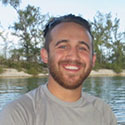
Dan Freitas
Mapping Watch Lead, NOAA Ocean Exploration
Daniel Freitas is from Rochester, New York. He worked for NOAA as a general vessel assistant for over three years in the augment pool while attending Coastal Carolina University, where he studied marine biology and applied mathematics. Over the last eight years, he has worked in the deck, engineering, and survey departments aboard many NOAA vessels before taking a permanent position aboard NOAA Ship Okeanos Explorer for 1.5 years. For the last six years years, he has worked as an independent contractor via the University Corporation for Atmospheric Research on Okeanos Explorer, supporting the NOAA Ocean Exploration mapping team. His time aboard consists of acting as a mapping watch lead, helping train and direct explorers-in-training, and working with the senior survey technician and other crew members to ensure the ship’s operations are completed.
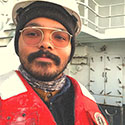
Treyson Gillespie
Mapping Watch Lead, NOAA Ocean Exploration
Treyson (Trey) Gillespie lives in Charleston, South Carolina, and has always had a fascination about the natural world, particularly our ocean and its processes. It was due to this intrigue that Trey found marine sciences and pursued a Bachelor of Science in geology and environmental geosciences from the College of Charleston. He is currently working toward a Master of Science in environmental studies from the same institution. During his studies, he has participated in an assortment of internship and field opportunities both domestic and international, including mapping and remotely operated vehicle operations aboard several NOAA ships. Through these experiences, he has gained invaluable knowledge with a wide variety of sonar vessel configurations.
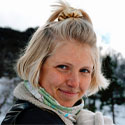
Paige Hoel
Explorer-in-Training, NOAA Ocean Exploration
Paige Hoel is an oceanography PhD student at the University of California, Los Angeles. Paige fell in love with the ocean at the age of three, and that love has only expanded through her education and personal life. As an undergraduate, Paige pursued degrees in physical geography and earth science at UC Santa Barbara, while still managing to swim and surf in the cold Pacific waters whenever possible. In this time, she became more acquainted with mapping techniques, and saw its incredible utility in ocean exploration. Among other experiences, Paige conducted research on local crab distributions, worked a mapping internship with an international offshore wind farming company, and completed a senior thesis. Her thesis created a risk metric for marine biodiversity loss globally, merging her love of the ocean and passion for spatial science. After graduating in 2018, Paige spent a year as a visiting scientist at the National Center for Atmospheric Research in Boulder Colorado. Here she worked on mapping applications for the Research Applications Laboratory. She began her graduate career at UCLA in 2019, working on biogeochemical modeling in the Southern California Bight. Her current research investigates the spatial linkages of giant kelp and ocean acidification hotspots.
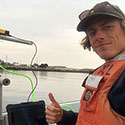
Marcel Peliks
Mapping Watch Lead, NOAA Ocean Exploration
Marcel Peliks is a graduate student working towards his Master of Science in geological oceanography at Moss Landing Marine Laboratories. His thesis is focused on developing multibeam mapping capabilities for the school, as well as conducting preliminary surveys of Monterey Canyon and surrounding beaches. In 2021, he was a NOAA Ocean Exploration mapping explorer-in-training and participated in the cloud mapping pilot project for the 2021 NOAA Ship Okeanos Explorer field season. Participating from his home in California, Marcel helped test all aspects of the cloud-based mapping system. His efforts contributed to standard operating procedures for future cloud mapping operations. Marcel has previously sailed aboard Okeanos Explorer as an at-sea explorer-in-training. After completing graduate school, Marcel plans to pursue career opportunities that apply his knowledge of geologic processes and instrumentation to ocean exploration.
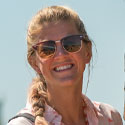
Caitlin Ruby
GIS Lead, NOAA National Centers for Environmental Information
Caitlin Ruby is a video and geospatial data manager with NOAA’s National Centers for Environmental Information through the University of Colorado’s Cooperative Institute for Research in Environmental Sciences. Caitlin always knew she would someday work in the ocean sciences, and has held positions with the Naval Oceanographic Office, NASA, the Naval Research Laboratory, and NOAA. She earned her bachelor's in geography from the University of Southern Mississippi and her master's degree in geospatial sciences from Mississippi State University. Her graduate research focused on improving the geospatial visualization of NOAA Ocean Exploration’s remotely operated vehicle (ROV) video data. Caitlin is thrilled to work with such a wonderful group of data scientists, researchers, and explorers, and always looks forward to watching ROV Deep Discoverer's live video from the deep!
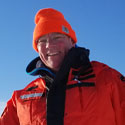
Marshall Swartz
Researcher, Woods Hole Oceanographic Institution
Marshall Swartz grew up in Western Pennsylvania and spent every summer for 21 years on the shores of Lake Michigan, where he loved the water and working in a marina doing anything he could to take apart motors and boats. After he received a bachelor’s degree in electrical engineering from Duke University, he joined the Physical Oceanography Department at Woods Hole Oceanographic Institution (WHOI). He then returned to school and received a Master of Business Administration from University of Michigan. After a decade with General Electric and Allied-Signal progressing in engineering, sales, and management positions, he returned to WHOI to lead the CTD (conductivity, temperature, depth) operations group for the World Ocean Circulation Experiment hydrographic program and other similar programs. He has participated on dozens of specialty sampling, coring, and hydrographic expeditions around the world and has worked with numerous WHOI programs. He provides specialized calibration services for CTD systems and is responsible for support and maintenance of WHOI’s eight primary CTD/sampler systems. Marshall has developed and launched new instrumentation for sampling, telemetry, imaging; assists with multidisciplinary and international science missions; and provides other research institutions and groups with on-site technical assistance. He most enjoys opportunities to go to sea to train and mentor others.

Chris Wright
Data Engineer, Global Foundation for Ocean Exploration
Chris Wright holds a Bachelor of Science in business administration from the University of Mary Washington and a Master of Business Administration from Rollins College. After graduation, he worked as a network and systems administrator and engineer in the hospitality industry in the Northeast and Mountain West for more than 15 years. Recently relocating back to the East Coast, Chris joined the Global Foundation for Ocean Exploration (GFOE) data team in early 2019 as one of the newest members of the organization. In 2019, he completed his first expedition aboard NOAA Ship Okeanos Explorer and is extremely excited about continuing the journey to explore the oceans around the world. When he isn't sailing on Okeanos Explorer, he’s busy working in GFOE’s Quonset office planning, designing, and implementing data solutions to help refine and mature its base of operations for ocean exploration. Chris and his family currently reside in Newport, Rhode Island.

Liang Wu
John A. Knauss Marine Policy Fellow, NOAA Ocean Exploration
Liang Wu is a 2022 John A. Knauss marine policy fellow, working in both the science and technology, and outreach and education divisions of NOAA Ocean Exploration and supporting science communication. He is a doctoral candidate at the Graduate Center of the City University of New York who has been studying the international shipping industry and seafarers' lives since 2006. Liang holds a Master of Philosophy and a Bachelor of Social Science in anthropology from the Chinese University of Hong Kong as well. His NSF-funded, interdisciplinary doctoral research examines the lived experiences and meanings of contemporary seamanship that are integral to the transportation of 90% of global trade including everyday commodities. His dissertation reflects on the complex reality of globalization, maritime infrastructure and mobility, techno-capitalism, and labor. Liang is very interested in the intersection of marine sciences and the social sciences, technology and humans, and government and society, especially how marine policies and laws affect ocean exploration and navigation, and economic viability and environmental sustainability at large.